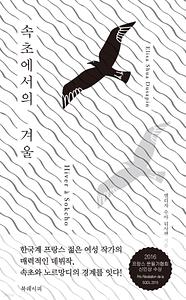Take a photo of a barcode or cover
emotional
reflective
medium-paced
Plot or Character Driven:
Character
Strong character development:
No
Loveable characters:
Complicated
Diverse cast of characters:
No
Flaws of characters a main focus:
Yes
i am so lucky to have two 5 star reads in a row
beautiful book of yearning with beautiful prose
could say so much more, will be thinking about this one for a while
beautiful book of yearning with beautiful prose
could say so much more, will be thinking about this one for a while
The protagonist of Winter in Sokcho finds herself back in her hometown after university and while some might say not much happens in the book, I'd say the driftlessness belies what it is for a person to look to the next stage of life and have to make big decisions when you discover it's all on you from this point forward.
She meets a Frenchman staying at the guest house she works at and it brings into question the things she believes about herself and those around her. She finds him confounding and compelling simultaneously. While looking to the future she is held to traditions by her mother, who she is staying in Sokcho with.
She meets a Frenchman staying at the guest house she works at and it brings into question the things she believes about herself and those around her. She finds him confounding and compelling simultaneously. While looking to the future she is held to traditions by her mother, who she is staying in Sokcho with.
Fast read. Light on plot. Rich in scenic details. I could identify with protagonist in the sense that she is half Korean and speaks Korean but is often treated as a foreigner in her hometown
Il ne connaîtrait jamais Sokcho comme moi. On ne pouvait pas prétendre la connaître sans y être né, sans y vivre l’hiver, les odeurs, le poulpe. La solitude.
He’d never understand what Sokcho was like. You had to be born here, live through the winters. The smells, the octopus. The isolation.
(20-21)
Suintant l’hiver et le poisson, Sokcho attendait.
Sokcho ne faisait qu’attendre. Les touristes, les bateaux, les hommes, le retour du printemps.
Oozing winter and fish, Sokcho waited.
That was Sokcho, always waiting, for tourists, boats, men, spring.
(82)
He’d never understand what Sokcho was like. You had to be born here, live through the winters. The smells, the octopus. The isolation.
(20-21)
Suintant l’hiver et le poisson, Sokcho attendait.
Sokcho ne faisait qu’attendre. Les touristes, les bateaux, les hommes, le retour du printemps.
Oozing winter and fish, Sokcho waited.
That was Sokcho, always waiting, for tourists, boats, men, spring.
(82)
A quiet, lonely little read. It really captures the feel of what a summer town feels like in stark winter. The author touches on a lot of themes (body image, loneliness, colonialism, etc.) but does so so lightly that I don't think I always got the point she was trying to make.
emotional
sad
fast-paced
Plot or Character Driven:
A mix
Strong character development:
Yes
Loveable characters:
Yes
Diverse cast of characters:
Yes
Flaws of characters a main focus:
Yes
Winter in Sokcho: Kerrand's Review
Winter in Sokcho, the debut novel from author Elisa Shua Dusapin, is the first-person narrative of a young French-Korean woman (whose name is never revealed), educated in Seoul but having returned to her unremarkable hometown of Sokcho. The book mainly revolves around her emerging-but-awkward relationship with a French artist. His name is Kerrand. And that’s me.
It makes sense that she wrote about our encounter. If I were not French, I would be tempted to say our time together was the epitome of je ne sais quoi, but of course being French I could not descend to such cliches. It was strange and powerful. A few minutes searching synonyms on the internet shows me that the English word I’m looking for is “ineffable”. The ineffable, fleeting collision of our lives.
Elisa (I know I should use her last name, but it’s too odd for me, as I never learned it until the book) writes beautifully. I’m an illustrator, not an author, but I find her style to be crisp, rhythmic, and yes, even pretty. In length, it can only be considered a novella. It clocks in at under one hundred and sixty pages, but with dozens of chapter breaks (shrugging off the convention of being named or numbered), it reads even shorter.
The narrative made me sad at times. Why didn’t Elisa name the protagonist? At first I thought it may have been a problem as to the continuity of the story whether she should have a French or a Korean name. However, I realized later, it was central to her theme. A woman with no name might be seen, but she cannot be known.
The issues with body image, female relationships, and food all were concealed behind her curtain of beauty and wit. I never saw them. It's strange -- every time I come to know a woman who does not mention these things, I still assume it means they do not experience them. I should have learned their universality by now. Why could she not? For the same reasons she felt she could not speak to me in French?
I was shocked that the narrator never explicitly mentions our age gap, simply making a factual statement as to the year of my birth on page one. It was my primary concern throughout and surely was the driver of my mercurial behavior toward her. Her youth, expressed physically and emotionally, was ever before me. I could not see past the decades of inkstain on my hands, the ache in my back from twenty years (which was the distance between us) of huddling over sketchbooks, and though my body is lean, it is soft from a steady diet of packaged pastries, as Elisa uncovered to all. I thought her merely polite in not teasing me for being near her mothers age. Why had I assumed so much?
Of course, no, my name is not Kerrand. I appreciate the attempt to cloak my identity, though anyone with even a cursory knowledge of the graphic novel genre would immediately recognize me from the description of my work. And it is the descriptions of my work which I found most breathtaking. The care and attention with which Elisa depicts my physical form while creating my art was an out-of-body experience. The words melting into the motion of my pen, the dripping of the ink, the curve of my hand. And the sounds? How had I never considered the scratching of my pen as the requiem for my hero’s conquests? These passages compressed and reformed into images such that I’m not sure I remember the words at all.
I did not want to like this book. As you can imagine I was uncomfortable with the very idea of it. But I cannot lie. What I experienced in Sokcho, I see now, was the inevitable result of a longing. That is the soul of Winter in Sokcho. The longing for knowledge of oneself, and the longing to have oneself be known.
Winter in Sokcho, the debut novel from author Elisa Shua Dusapin, is the first-person narrative of a young French-Korean woman (whose name is never revealed), educated in Seoul but having returned to her unremarkable hometown of Sokcho. The book mainly revolves around her emerging-but-awkward relationship with a French artist. His name is Kerrand. And that’s me.
It makes sense that she wrote about our encounter. If I were not French, I would be tempted to say our time together was the epitome of je ne sais quoi, but of course being French I could not descend to such cliches. It was strange and powerful. A few minutes searching synonyms on the internet shows me that the English word I’m looking for is “ineffable”. The ineffable, fleeting collision of our lives.
Elisa (I know I should use her last name, but it’s too odd for me, as I never learned it until the book) writes beautifully. I’m an illustrator, not an author, but I find her style to be crisp, rhythmic, and yes, even pretty. In length, it can only be considered a novella. It clocks in at under one hundred and sixty pages, but with dozens of chapter breaks (shrugging off the convention of being named or numbered), it reads even shorter.
The narrative made me sad at times. Why didn’t Elisa name the protagonist? At first I thought it may have been a problem as to the continuity of the story whether she should have a French or a Korean name. However, I realized later, it was central to her theme. A woman with no name might be seen, but she cannot be known.
The issues with body image, female relationships, and food all were concealed behind her curtain of beauty and wit. I never saw them. It's strange -- every time I come to know a woman who does not mention these things, I still assume it means they do not experience them. I should have learned their universality by now. Why could she not? For the same reasons she felt she could not speak to me in French?
I was shocked that the narrator never explicitly mentions our age gap, simply making a factual statement as to the year of my birth on page one. It was my primary concern throughout and surely was the driver of my mercurial behavior toward her. Her youth, expressed physically and emotionally, was ever before me. I could not see past the decades of inkstain on my hands, the ache in my back from twenty years (which was the distance between us) of huddling over sketchbooks, and though my body is lean, it is soft from a steady diet of packaged pastries, as Elisa uncovered to all. I thought her merely polite in not teasing me for being near her mothers age. Why had I assumed so much?
Of course, no, my name is not Kerrand. I appreciate the attempt to cloak my identity, though anyone with even a cursory knowledge of the graphic novel genre would immediately recognize me from the description of my work. And it is the descriptions of my work which I found most breathtaking. The care and attention with which Elisa depicts my physical form while creating my art was an out-of-body experience. The words melting into the motion of my pen, the dripping of the ink, the curve of my hand. And the sounds? How had I never considered the scratching of my pen as the requiem for my hero’s conquests? These passages compressed and reformed into images such that I’m not sure I remember the words at all.
I did not want to like this book. As you can imagine I was uncomfortable with the very idea of it. But I cannot lie. What I experienced in Sokcho, I see now, was the inevitable result of a longing. That is the soul of Winter in Sokcho. The longing for knowledge of oneself, and the longing to have oneself be known.
dark
emotional
mysterious
reflective
sad
tense
medium-paced
Plot or Character Driven:
Character
Strong character development:
Complicated
Loveable characters:
No
Diverse cast of characters:
Complicated
Flaws of characters a main focus:
Complicated





